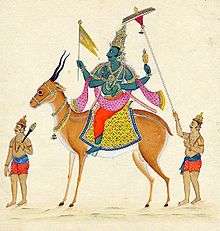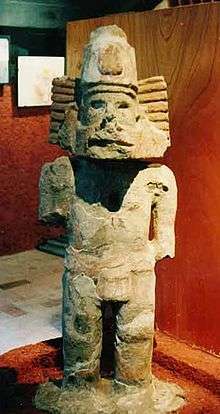List of wind deities
A wind god is a god who controls the wind(s). Air deities may also be considered here as wind is nothing more than moving air. Many polytheistic religions have one or more wind gods. They may also have a separate air god or a wind god may double as an air god. Sometimes even a water god.

The Hindu wind god, Vayu.
Africa and the Middle East
Afroasiatic Middle East
Egyptian
Western Eurasia
Albanian
Balto-Slavic
Lithuanian
- Vejopatis, god of the wind according to at least one tradition
Slavic
- Dogoda is the goddess of the west wind, and of love and gentleness.
- Stribog is the name of the Slavic god of winds, sky and air. He is said to be the ancestor (grandfather) of the winds of the eight directions.
- Varpulis is the companion of the thunder god Perun who was known in Central Europe and Lithuania.
Celtic
Norse-Germanic
Greaco-Roman
- Aeolus, keeper of the winds; later writers made him a full-fledged god
- Anemoi, (in Greek, Ἄνεμοι—"winds") were the Greek wind gods
- Boreas, god of the north wind and of winter
- Eurus, god of the east or southeast wind
- Notus, god of the south wind
- Zephyrus, god of the west wind
- Aparctias, another name for the north wind (not identified with Boreas)
- Apheliotes, god of the east wind (when Eurus is considered southeast)
- Argestes, another name for the west or northwest wind
- Caicias, god of the northeast wind
- Circios or Thraskias, god of the north-northwest wind
- Euronotus, god of the southeast wind
- Lips, god of the southwest wind
- Skeiron, god of the northwest wind
- Aura, the breeze personified
- Aurai, nymphs of the breeze
- Cardea, Roman goddess of health, thresholds, door hinges, and handles; associated with the wind
- Venti, (Latin, "winds") deities equivalent to the Greek Anemoi
Western Asia
Hindu-Vedic
Persian Zorostarian
- Vayu-Vata, two gods often paired together; the former was the god of wind and the latter was the god of the atmosphere/air.
Uralic
Finnish
- Ilmarinen, blacksmith and god of the wind, weather and air.
- Tuuletar, goddess or spirit of the wind.
Hungarian
- Szélatya, the Hungarian god of wind
- Szélanya, the Hungarian goddess of wind and daughter of the primordial god Kayra
- Zada, keeper of the precious Yada Tashy stone
Sami
- Bieggolmai, unpredictable shovel-wielding god of the summer winds
- Biegkegaellies, god of the winter winds
Asia-Pacific / Oceania
Far East Asia
Chinese
- Fei Lian, the Chinese wind god; Feng Bo is the human form of Fei Lian
- Feng Po Po, the Chinese wind goddess
- Feng Closa, general of the wind
- Han Zixian, assistant goddess of the wind
Japanese
- Fūjin, the wind god
- Shinatsuhiko, god of the winds
Korean
- Yondung Halmoni, goddess revered by farmers and sailors
Austronesia
Philippine
- Amihan, the Tagalog and Visayan goddess of the northeast winds. She is also known as Alunsina.
- Anitun Tabu, the fickle-minded ancient Tagalog goddess of wind and rain.
- Apo Angin, the Ilocano god of wind.
- Buhawi, the Tagalog god of whirlwinds and hurricanes' arcs. He is the enemy of Habagat.
- Habagat, the Tagalog god of winds and also referred to as the god of rain, and is often associated with the rainy season. He rules the kingdom of silver and gold in the sky, or the whole Himpapawirin (atmosphere).
- Lihangin, the Visayan god of the wind.
- Linamin at Barat, the goddess of monsoon winds in Palawan.
Polynesian
Hawaiian
- Hine-Tu-Whenua, Hawaiian goddess of wind and safe journeys
- La'a Maomao, Hawaiian god of the wind and forgiveness
- Pakaa, Hawaiian god of the wind and inventor of the sail
Winds of Māui
The Polynesian trickster hero Māui captured or attempted to capture many winds during his travels.
- Fisaga, the gentle breeze, the only wind that Māui failed to capture
- Mata Upola, the east wind
- Matuu, the north wind
Māori
- Hanui-o-Rangi
- Tāwhirimātea, Māori god of weather, including thunder and lightning, wind, clouds, and storms
Native America
North America
Anishinaabe
- Epigishmog, god of the west wind and spiritual being of ultimate destiny
Cherokee
- Oonawieh Unggi, the ancient spirit of the wind
Iroquois
- Da-jo-jo, mighty panther spirit of the west wind
- Gǎ-oh, spirit of the wind
- Ne-o-gah, cam dubs gentle fawn spirit of the south wind
- O-yan-do-ne, moose spirit of the east wind
- Ya-o-gah, destructive bear spirit of the north wind who is stopped by Gǎ-oh.
Inuit
- Silap Inua, the weather god who represents the breath of life and lures children to be lost in the tundra
Lakota
- Okaga, fertility goddess of the south winds
- Taku Skanskan, capricious master of the four winds
- Tate, a wind god or spirit in Lakota mythology
- Waziya, giant of the north winds who brings icy weather, famine, and diseases
- Wiyohipeyata, god of the west winds who oversees endings and events of the night
- Wiyohiyanpa, god of the east winds who oversees beginnings and events of the day
- Yum, the whirlwind son of Anog Ite
Navajo
- Niltsi, ally of the Heroic Twins and one of the guardians of the sun god's home.[3]
Pawnee
- Hotoru, the giver of breath invoked in religious ceremonies[4]
Central American and the Caribbean
Aztec
- Cihuatecayotl, god of the west wind
- Ehecatotontli, gods of the breezes
- Ehecatl, god of wind
- Mictlanpachecatl, god of the north wind
- Tezcatlipoca, god of the night wind and hurricanes
- Tlalocayotl, god of the east wind
- Vitztlampaehecatl, god of the south wind
Mayan
Taino
- Guabancex, goddess of the wind and hurricanes
South America
Quechua
- Huayra-tata, god of the winds
gollark: I was considering also building semantic search into some iteration of Minoteaur, with vast quantities of "AI" stuff.
gollark: Also, consider SQLite FTS.
gollark: Anyway, as an accursed hack, surely you can be safe by only escaping <.
gollark: Huh. It doesn't seem to mention it. How bad.
gollark: It would be ridiculous *not* to.
See also
- Sky god
- Weather god
References
- http://windlegends.org/windgods.htm
- Yeats, William Butler, The Collected Poems, 1933 (First Scribner Paperback Poetry edition, 1996), ISBN 0-684-80731-9 "Sidhe is also Gaelic for wind, and certainly the Sidhe have much to do with the wind. They journey in whirling wind, the winds that were called the dance of the daughters of Herodias in the Middle Ages, Herodias doubtless taking the place of some old goddess. When old country people see the leaves whirling on the road they bless themselves, because they believe the Sidhe to be passing by." Yeats' Notes, p.454
- http://glitternight.com/navajo-myth-clear/
- http://www.sacred-texts.com/nam/por/por82.htm
This article is issued from Wikipedia. The text is licensed under Creative Commons - Attribution - Sharealike. Additional terms may apply for the media files.
